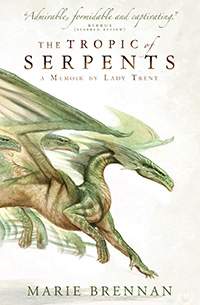
She lives in the San Francisco Bay Area, where she spends her time practicing piano, studying karate, and playing a variety of role-playing games.
Her most recent work is as the author of 'The Lady Trent Memoirs' which currently stands at two books, the first, 'A Natural History of Dragons' and it's follow up, out now, 'The Tropic of Serpents'.
For those who are unfamiliar with the series, they concern Isabella, Lady Trent, the world's preeminent dragon naturalist. A remarkable woman, she brought the study of dragons out of the misty shadows of myth and misunderstanding into the clear light of modern science.
But before she became the illustrious figure we know today, there was a bookish young woman whose passion for learning, natural history, and, yes, dragons defied the stifling conventions of her day. Here at last, in her own words, is the true story of a pioneering spirit who risked her reputation, her prospects, and her fragile flesh and bone to satisfy her scientific curiosity.
SCI-FI-LONDON is lucky enough to be a whistle stop on Marie Brennan's blog tour, in support of The Tropic of Serpents and she's written a piece especially for us on a subject clearly near and dear to her heart - rebels.
I've always had a soft spot for stories about the plucky girl who runs off and disguises herself as a boy to have adventures. I read Tamora Pierce's Song of the Lioness series (i.e. "the Alanna books") at an early age, and still enjoy stories of that type now.
They're not purely fantasy, either. Catalina de Erauso was a seventeenth-century Basque woman who ran away from the convent where she'd been raised, started cross-dressing as a man, and went to South America as a conquistador. Her life wasn't entirely admirable - at one point she accidentally killed her own brother in a duel - but the point is, she sounds like a character out of a fantasy novel, and she was real.
But most historical women who rebelled against society's strictures weren't that blatant about it. They didn't run away from home. They had parents who were willing to educate them beyond the norm, or else they educated themselves through borrowed books and sympathetic friends. Not all of them got married (Elizabeth Carter remained a spinster her whole life), but many did, and the lucky or cunning ones got husbands who shared, supported, or at least tolerated their interests. When their husbands died or were absent, women took control of the business or the estate, or they operated as regents for their underage sons. They found like-minded friends and formed groups like the French salóns or the English Bluestocking Society, where they could support one another and create new opportunities.
Pursuing your own goals through the obstacle course of society's expectations wasn't easy (and still isn't). Christopher Haigh wrote an excellent book on Elizabeth I for a series called "Profiles in Power," where he makes it clear that even the Queen of England - theoretically the most powerful person in her realm - had to tread carefully to keep from being sidelined by her nobles or military commanders or Parliament. In scientific fields, history often dismisses such women as as "assistants" or "secretaries," but those words can hide a wide variety of roles: Nicole-Reine Lapaute played a vital role in calculating the return of Halley's Comet in 1759, though only one of the two other members of the team acknowledged her work.
The thing about blatant rebellion is, it comes with a price. When Joan of Arc was put on trial for heresy, one of the recurrent charges brought against her was her habit of wearing men's clothing (which was, among other things, a defence against being raped). Fire-eating iconoclasts were often rejected by society, which could result in poverty, depression, violence. Some of them went ahead anyway, and some of them even made it work. But they're outnumbered by the smaller, quieter rebellions, the women who threaded a path through the conflicting demands of their own sense of self and the world around them.
I like the stories about the girls who flip society the bird and end up being applauded for it. But I want more stories of the other sort, too: tales of women who don't reject every aspect of being female, who balance conventional behaviour with a surprising degree of individualism. They were real, too, and for most of us, their examples are much more within reach.
Marie Brennan, 2014

They're lovely books, written in the no-nonsense, observatory tone of a memoir and despite being, on the surface, all rather neatly parcelled up as a travelogue and about her adventures studying dragons, under the surface is a rather more contemporary tale of corporatisation and the plundering of natural resources, sprinkled with the breaking down of political, social, and cultural barriers and topped with issues around gender and identity, as any book featuring a woman in ostensibly a man's world, would do.
For some people, the conceit that makes these books unique, the memoir style, will also be the thing that turns them away because they don't read as straightforward narrative, they meander and digress, much like any train of thought, and this impacts the pacing, but on the whole it's this style that will bring you back to them, being as it is, warm and witty and very elegantly crafted.
Heartfelt thanks from SCI-FI-LONDON to Marie Brennan for writing the piece for us. You can find out more about her books at Marie's website and you can follow her on Twitter.